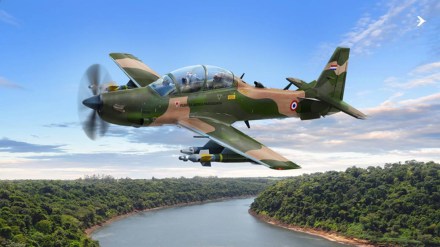Embraer has announced the sale of six A-29 Super Tucano aircraft to the Paraguayan Air Force (FAP), a deal that underscores the growing influence of Embraer in the global aerospace market. Scheduled for delivery from 2025, this agreement includes mission equipment and an integrated logistics services agreement, providing the FAP with a versatile and advanced aircraft for various missions.
“We are honoured by the Paraguayan Air Force (FAP) decision and very pleased to be able to announce more A-29 Super Tucano sales, which is a leading aircraft in the international market in its segment. We are confident that the A-29 meets the current and future needs of the FAP,” said Fabio Caparica, Commercial Vice President for Latin America at Embraer Defence & Security.
About A-29 Super Tucano
The A-29 Super Tucano is renowned for its versatility, capable of performing armed reconnaissance, close air support, light attack, and advanced training missions. With over 260 orders globally and more than 550,000 flight hours, including 60,000 in combat, it is a proven and reliable platform. Air General Júlio Rubén Fullaondo Céspedes, Commander of the Paraguayan Air Force, highlighted the aircraft’s role in enhancing national security and addressing modern threats like drug trafficking and transnational organized crime.
“To face emerging threats, we are in the process of modernizing our aerial and detection capabilities, and we intend to be up to the technological standards that allow us to correctly apply the measures established in the Law on Surveillance and Protection of Paraguayan Airspace to effectively contribute to the preservation of regional and international peace and security,” said Céspedes.
Maintenance, Repair, and Overhaul
Embraer’s Services & Support division is also experiencing rapid growth, driving the company’s expansion with high-skilled, innovative services. This division has announced several new initiatives, including new Maintenance, Repair, and Overhaul (MRO) facilities, full-flight simulators, and updates to its Aircraft Health Analysis and Diagnosis (AHEAD) platform.
In the past year, Embraer Services & Support has doubled its maintenance service capacity for executive jets in the United States, adding three new MRO facilities. In Europe, the company has expanded its capacity for executive jets in Le Bourget, France. Additionally, the global network of full-flight simulators is growing, with new simulators for commercial aviation and executive jets being introduced worldwide.
“Our business unit has reached a US$ 3.1 billion record backlog in 2024, by offering the best-in-class agnostic services in key market areas such as MRO (Maintenance, Repair, and Overhaul), Engines, Aerostructures, Training, Materials, Modifications, and Conversions. Embraer Services & Support aims to continue expanding its global footprint, strengthening its position as a growth driver for Embraer,” said Carlos Naufel, President and CEO of Embraer Services & Support.
The Pool Program, which supports 66 airlines worldwide, has seen significant growth, with over 180 E-Jets joining the program since 2023. This program helps airlines reduce repair and inventory costs while ensuring high performance and cost predictability.
Embraer’s AHEAD platform has also been updated to optimize maintenance operations. Enhancements include improved tracking of adverse events and a new fuel consumption module. These features help airlines predict maintenance needs, enabling more efficient operations and reducing downtime.
E-Jets connectivity
The company is also expanding its E-Jets connectivity solutions, with more than 30 E-Jets worldwide receiving fast Wi-Fi integration. This initiative enhances the passenger experience and keeps operators’ fleets connected.
The Brazilian aerospace company’s commitment to sustainability is evident in its advancements in reducing aircraft emissions. The E-Jets E2 family is already capable of operating with 100% Sustainable Aviation Fuel (SAF), and the company aims to certify 100 percent SAF use for commercial flights. In August 2021, Embraer completed the first flight of its Electric Demonstrator, a fully electric single-engine aircraft. A hydrogen fuel cell demonstrator is planned for 2025, and Eve, Embraer’s urban air mobility spin-off, is developing a fully electric vertical take-off and landing vehicle, expected to enter service by 2026.
Embraer’s goal is to achieve carbon neutrality by 2040, with a focus on using 25% SAF by 2040 and 100 percent renewable energy by 2030. The company’s sustainable practices and innovative technologies position it as a leader in the aerospace industry, committed to reducing its environmental impact while enhancing its global footprint.
